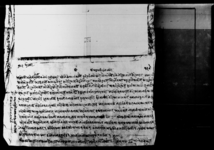A deed of emancipation written by Rājakumārī Pãḍenī for her slave Gopāle (VS 1943)
ID: K_0118_0033
Edited and
translated by Manik Bajracharya
in collaboration with
Bal Gopal Shrestha
Created: 2017-01-05;
Last modified: 2018-06-21
For the metadata of the document, click here
The accompanying edition, translation/synopsis and/or commentary are available under the terms of the Creative Commons Attribution-ShareAlike 4.0 International License
Abstract
This is the note written to a slave named Gopāle, freed by Rājakumārī Pãḍenī. Gopāle was freed on condition that he serve Rājakumārī Pãḍenī throughout the remainder of her life.Diplomatic edition
[1r]
1श्री1श्रीपसुपतीगुजेस्वरी1⟪१२नं.⟫1स्हीगोपाल1सकलवमोजिनकलदुरूस्तभनिस2हीछाप्गर्नेगोपालेघर्ति ¯¯1स्वस्तिश्रीनरदेवी⟪टोल⟫वस्न्याकजेनीराजकुमारिपडेनिछेत्र्यानीकस्यैहरिवदंनकोछोरोगोपालेकेटाकेतेरीआमालेमेरोस्यहारसंभारगरि
2आयाकोहुनाले१९४३सालकामाघमैन्हामातेरिआमावेरामिभैरूदारअसाध्येहुदामाघिपुर्नेवाकाचत्तुरदसिकादीन्घाट्ऊठाउ[?]
3वेलामामेरामर्नेवषत्भोमेरोछोरोगोपालेवालषछहजुर्कोमैलेसोझोचीताईचाकरिगरेकैहुंहामीआमाछोरालाई[?]
4म्करवाटफुर्सतगरीवक्स्याहाम्रोपनीपरत्रसप्रदोहोहजुरलाईपनिपुन्येहुदोहोभंदातेहिवषत्मातेरीआमालाईकाम
5करहाड्वाटपारगरीरतवालषहुनालेतलाइस्मेत्हाड्पारगरीदीय़ाथ्याँतेरीआमामर्दारतवालषहुनालेमेरा[?]
6वताभरलाइतेरोजिय़हाड्पारगरीदीय़ाँमेरोस्याहारसंभारगर्नुमेरोसेषपछीतेरोजियेहाड्काम्करवाट[?]
7गरीदीञाआफुषुसीभैवस्नुमेरासेषपछीतलाइमेरादैय़ादारहकवालास्मेत्अरुगैर्हलेलोभानीपापानिगरी[?]
8[?]य़ाहोभनिजस्लेपक्राऊगर्लाभन्लातस्लाइमाहापंचपातक्लागीगि ¯ ¯कोकुद्रोष्टीभैनरक्कोभोगगर्नु
9परोसभनिमेरामनोमानषुसिराजिसंगपारपत्रलेषिनिजतगोपालेलाइदियाँयेस्पत्रकासाछीछौडोलवस्न्या
10लेफटेंभिम्वलकुव़र१रुपिंवस्न्यादेवनीधीपाध्या१वैद१ठमेलवस्नेषङ्गधोजभडारीछेत्री१लेषककासा
11छीप्रय़ागदत्तपाध्याइतिसम्वत्१९४३सालमितिमाघसुदी१४रोज१सुभ्म् ¯¯¯¯¯¯¯¯¯¯¯¯¯¯¯¯¯¯
12श्रीकृष्णचरणराजकुमारीसरणभंन्येछापलापच्येसहीमसीनमीलेकोसहीप्रेम्वाहादुरभंन्येलेषेको
Translation
[1r]
Glorious Paśupati [and] Guhyeśvarī
No. 121
Signed [by] Gopāla2
Signed by Gopāle Ghartī in attestation that the copy is identical to the original3
Hail! From the venerable Kajenī4 Rājakumārī Pãḍenī Chetryānī, resident of Naradevī Ṭola, to the slave-boy (keṭā) Gopāle, the son of Harivadaṃna.
Your mother was [for a long time] taking care of me. In the month of Māgha in the year [VS] 1943, your mother became sick, kept crying out and could not be cured, and on the full moon day of Māgha, on vākā5 caturdaśī, as she was being brought to the burning ghats, she said: "The time of my death has come. My son, Gopāle, is still a child. I have served you with loyalty. If you could spare us, mother and son, from the subjection of [slave] labour (kāmakara), our future would flourish, and it would also be meritorious for you." I therefore freed your mother from the bondage of labour (kāmakara hāḍa) then and there and since you were a child I had freed you as well. Since your mother has died, and since you are still a child, I have freed you from bondage [on condition] that you [serve me] for the remainder of my life. Serve me. I free you from the bondage of labour, to take effect after my death. Live according to your wish [from that time on]. After my death, may whoever among the rightful claimants of my inheritance, out of greed or evil intention, holds you [back], considering you as a household slave (kariyā), incur the five great sins, be struck by the evil eyes of glorious Paśupati and Guhyeśvarī, and endure hell. Having written [this] deed of emancipation willingly, I handed it over to you, Gopāle. The witnesses to this letter are: Lieutenant Bhimbala Kũvara of Chauḍola - 1, Devanīdhī Pādhyā of Rupiṃ - 1, Vaida - 1, Khaṅgadhvoja Bhaḍārī Chetrī of Ṭhamela - 1, [and] the witness of the writer Prayāgadatta Pādhyā.
Sunday, the 14th of the bright fortnight of Māgha in the [Vikrama] era year 1943 (1887 CE). Auspiciousness.
A fingerprint signature under a seal reading "The feet of glorious Kṛṣṇa [are] the refuge [of] Rājakumārī"; [and] since the (foregoing) signature, in a different ink (from the rest of the document), is unattested, [the name] Prema Bāhādura has been written.
Commentary
This is one of two documents copied together in a collection belonging to the Garuḍanārāyaṇa Guṭhī. Both this and the other document, K_0118_0032, officialize the emancipation of slaves by Rājakumārī Pãḍenī. In this document, Harivadaṃna and Gopāle, mother and son, are emancipated on the former's deathbed. The son, Gopāle, is freed on condition that he serve Rājakumārī throughout her life. The document explicitely states that the descendants of Rājakumārī shall have no authority over the freed slave Gopāle.
For more documents regarding a legal case involving Rājakumārī Pãḍenī, see K_0175_0018, K_0118_0039 etc., K_0175_0032 and K_0175_0033 which are the receipts of an expiation fee paid by her, and K_0175_0034 which is a patiyā-pūrjī issued to her.

